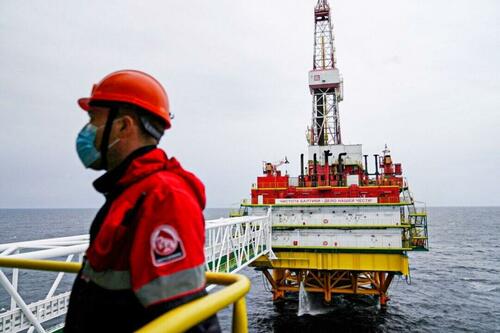Russian Oil Giant Lukoil Selling International Assets After Trump Sanctions
Authored by Tom Ozimek via The Epoch Times,
Russian oil company Lukoil said it plans to sell its international assets after sanctions imposed by the Trump administration targeted the company and fellow Russian energy giant Rosneft in a bid to pressure Russia into ending the war in Ukraine.
The company announced the decision on Oct. 27, saying that the move was a response to “restrictive measures” imposed by several countries, including the United States. The sanctions—announced by the U.S. Treasury Department’s Office of Foreign Assets Control (OFAC) on Oct. 22—froze Lukoil’s assets in the United States and barred U.S. companies and individuals from doing business with the company and its subsidiaries.
“Lukoil informs that owing to introduction of restrictive measures against the Company and its subsidiaries by some states the Company announces its intention to sell its international assets,” the oil giant said in a statement.
The company stated that it had begun “consideration of bids from potential purchasers” and would seek an extension of its OFAC “wind-down license” if it needs more time beyond the Nov. 21 grace period deadline to complete transactions.
‘Tremendous Sanctions’
The sanctions are part of U.S. President Donald Trump’s effort to pressure Russian President Vladimir Putin to halt military operations in Ukraine and agree to a cease-fire. They represent the first major round of economic penalties imposed on Moscow since Trump’s return to the White House for a second term.
“I just felt it was time,” Trump told reporters in the Oval Office on Oct. 22 while hosting NATO Secretary-General Mark Rutte. “These are tremendous sanctions. We hope they won’t be on for long. We hope that the war will be settled.”
The measures cover Rosneft and Lukoil, which together account for more than half of Russia’s crude oil exports, and nearly three dozen of their subsidiaries. They also open the door to secondary sanctions on foreign banks and companies that continue doing business with the blacklisted companies, effectively cutting off access to the U.S. financial system for violators.
“Now is the time to stop the killing and for an immediate ceasefire,” Treasury Secretary Scott Bessent, who oversees OFAC, said in an Oct. 22 statement. “Given President Putin’s refusal to end this senseless war, Treasury is sanctioning Russia’s two largest oil companies that fund the Kremlin’s war machine. Treasury is prepared to take further action if necessary to support President Trump’s effort to end yet another war.”
Lukoil’s international holdings are extensive, spanning 11 countries, including oil refineries in Bulgaria, Romania, and the Netherlands and stakes in upstream projects in Azerbaijan, Kazakhstan, Uzbekistan, Iraq, Egypt, Cameroon, Nigeria, Ghana, Mexico, the United Arab Emirates, and the Republic of the Congo.
The sanctions are a sharp turn from Trump’s earlier strategy of restraint while pursuing diplomatic channels to end the war. The president canceled a planned summit with Putin in late October, saying that talks had become “a waste of time.” His administration has also pressed countries such as India and China to curb Russian oil imports and warned of penalties for noncompliance.
The UK also imposed sanctions on Lukoil on Oct. 15, with British Foreign Secretary Yvette Cooper citing the need to pressure Russian leadership into a cease-fire.
“At this critical moment for Ukraine, Europe is stepping up,” Cooper said in a statement.
“Together, the UK and our allies are piling the pressure on Putin—going after his oil, gas and shadow fleet—and we will not relent until he abandons his failed war of conquest and gets serious about peace.”
The UK move targeted Lukoil, Rosneft, and 44 shadow fleet tankers, subjecting them to an asset freeze, transport restrictions, and a ban on UK trust services, meaning that UK companies can no longer help them set up or manage offshore accounts or companies.
Moscow Condemns ‘Unfriendly Act’
At the Kremlin, Putin condemned the U.S. sanctions as an “unfriendly act,” accusing Washington of undermining recently improving relations between the two countries.
“It is an obvious thing and it does not strengthen Russia–U.S. relations that have just started recovering,” he said on Oct. 23, state news agency TASS reported. “Certainly, the U.S. administration harms Russia–U.S. relations by such actions.”
The measures are expected to squeeze Russia’s finances at a crucial time. Oil and gas revenues account for roughly one-third of Moscow’s federal budget, funding both military spending and domestic subsidies that help cushion the economic blow of the war.
Putin said restrictions on Russian oil exports could push global energy prices higher, noting that, unlike Russia, the United States consumes more oil than it sells. He said the sanctions “will not have a significant impact” on Russia’s economy.
Tyler Durden
Wed, 10/29/2025 – 06:30ZeroHedge NewsRead More





 R1
R1
 T1
T1


